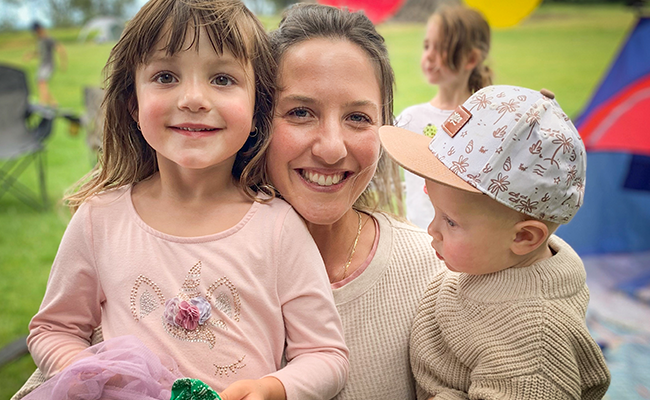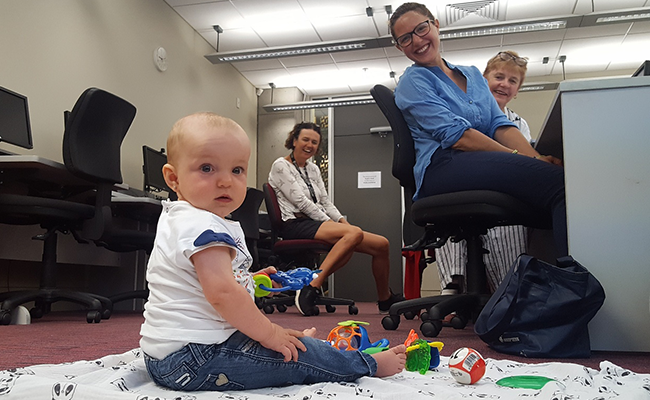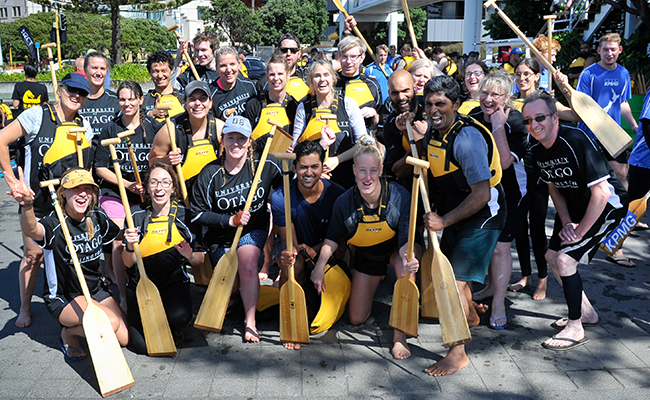 PhD graduate Carla Strubbia with her two children Anna and Luca.
PhD graduate Carla Strubbia with her two children Anna and Luca.
Otago PhD graduate Carla Strubbia finished her PhD with two days to spare, accomplishing her goal of finishing within three years all while becoming a parent of two, settling in a new country and dealing with a global pandemic.
Carla, an Italian physiotherapist, arrived in New Zealand with her French Canadian husband Eric Regnier in 2018 when she was pregnant with her first child.
Eric was taking up a job offer and Carla decided studying for her PhD with the Department of Medicine at the University of Otago's Wellington campus would be a flexible and interesting thing to do after they arrived.
She began work on her PhD in 2019, nine months after her first child, Anna (now four-years-old) was born, and finished writing her thesis with baby son Luca (just turned one) sleeping on her chest.
Asked if it had been challenging to have two children while working on a PhD, Carla laughs and adds, “and two lockdowns and a global pandemic, yes it was!”
Carla initially struggled with working in her second language and adjusting to the New Zealand accent.
“At the start I was so lost. I couldn't really understand what anyone was saying because it took me a while for my ear to get used to the Kiwi accent. You guys speak so fast. Sometimes where there were important meetings, I would ask if it was ok to record the meeting, so I could go home and listen to it again.”
Carla decided on her PhD topic with her supervisor, Professor William Levack, who as well as being a researcher with the Rehabilitation Teaching and Research Unit is Dean of the Wellington campus. Professor Levack had been working with Japanese researchers to develop an English-language version of an iPad app to use in collaborative goal setting in rehabilitation and he suggested she could conduct trials of the technology here.

Carla and baby Anna in an NVivo data analysis training session at the start of her PhD.
The idea fitted with Carla's desire to work on research which had a practical benefit, and they settled on her topic, 'The use of technology in supporting goal setting in rehabilitation'.
Doing her PhD during the COVID-19 lockdowns proved challenging. With day-care centres closed during Alert Level 4 lockdowns, she worked through the night while Anna slept.
She had been planning a visit to Japan to meet with research collaborators Professor Kounosuke Tomori, from the Tokyo University of Technology, and Professor Kayoko Takahashi, from Kitasato University in Tokyo, but her trip had to be cancelled because of the pandemic.
“All the fun aspects of a PhD where you are meeting people and networking, I wasn't able to do any of that. There was a lot to handle mentally. I wanted to quit maybe 100 times, especially during the pandemic. I didn't feel I was having any fun during my PhD. It was very hard work.”
Husband Eric talked her into continuing when she was struggling, and to make sure it did not continue to be all work and no play, Carla joined the Wellington campus's dragon boat team, training and competing two years in a row on Wellington Harbour with other students and staff.
Finding working on her own a lonely experience, she joined forces with close friend and PhD buddy Dr Ryan Sixtus to organise regular 'Shut up and Write' boot camps for postgraduate students, securing funding from the Graduate Research School in Dunedin. They later formed the Otago Postgraduate Association of Wellington (O-PAW) so students could continue to be supported.
Carla is grateful to her primary supervisor Professor Levack and secondary supervisor Professor Rebecca Grainger for their support during her PhD.
“I couldn't have asked for better supervisors. They were very supportive, really understanding and kind. (They had) every good quality you could ask for. They were very knowledgeable, amazing mentors with a very good work ethic. When you have these kind of supervisors, it makes your life much easier.”

Carla (front left) and Eric (centre back) with the dragon boat team.
Carla says having a clear timeline and learning time management skills was key to her success in finishing her PhD within her three-year window.
She advises other postgraduate students to make sure they don't lose momentum while working on their research.
“Just remind yourself, it doesn't have to be perfect, you just have to do it. If you try to be perfect, then you make yourself a very unreasonable goal.”
Carla got into the habit of submitting chapters to her supervisors in draft form and asking for feedback so she could keep moving forward.
“Don't be scared to call or reach out to people to give you feedback when you need it in order to keep to your timeframe,” she says. “When you do a PhD you need to pedal a lot, otherwise you will fall off the bike for sure.”
She advises students who are doing clinical research to be proactive about following up on ethics committee approvals.
“A few students I was talking to would say, 'I'm waiting for this, I am waiting for that', I would say, 'what are you waiting for?' Just call. Don't just wait forever for them to call you back.”
Carla finished the last leg of her PhD remotely after the family moved to Auckland in August 2021. In a strange coincidence, she was all packed and ready to move on from the Wellington campus on the same day the academic building was found to be earthquake prone.
“I had started packing all my documents the week before, and so I was all ready. I had been really sad that I was going to miss out on campus life, and then at 5pm they announced they were going to close the building.”
Carla is now working as a project coordinator for Te Whatu Ora | Te Toka Tumai Auckland (formerly the Auckland District Health Board) and sees her PhD as just a starting point.
“It gives you knowledge, but it is really a first step. I think it is just a driving licence for you to go into the world.”
Carla graduates in absentia on 16 December.
